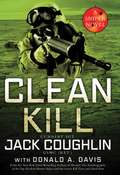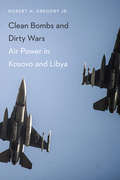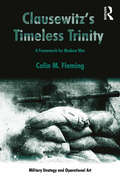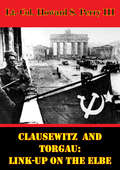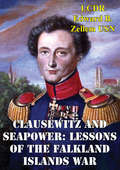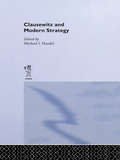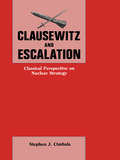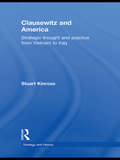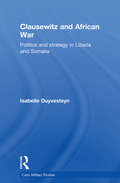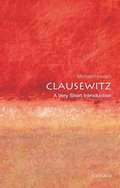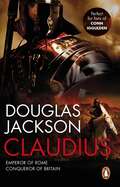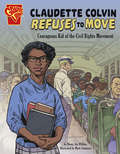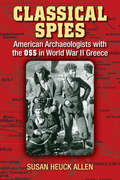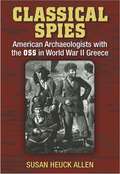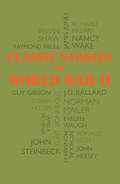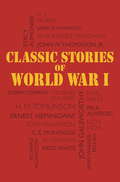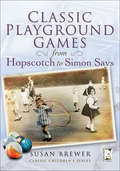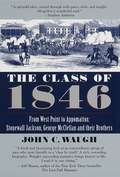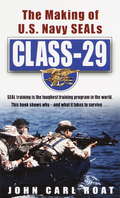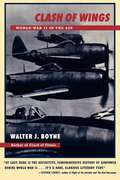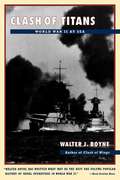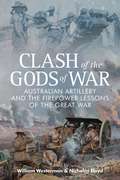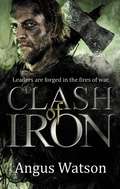- Table View
- List View
Clean Kill (Sniper Series #3)
by Jack Coughlin Donald A. DavisOn the heels of the New York Times bestselling Kill Zone and Dead Shot comes the most thrilling installment of the Kyle Swanson sniper saga yet. An attempt at peace in the Middle East is brutally shattered. Only Swanson can find out who is responsible, and why, before the world plunges into war. At an ancient castle in Scotland, Sir Geoffrey Cornwell is brokering an unprecedented peace agreement. Prince Abdullah of Saudi Arabia and the Israeli foreign minister are ready to sign a historic treaty--until their meeting is crushed by a missile strike that leaves the foreign minister of Israel dead and the prince wounded. Gunnery Sergeant Kyle Swanson is running covert missions in the mountains of Pakistan when he's called to the United Kingdom, and he arrives just as there is a follow-up terrorist attempt to kill the prince. The attackers aren't working for Al Qaeda--they are employed by foreign operatives determined to overthrow the government of Saudi Arabia and take the Saudi oil reserves by whatever means necessary. Meanwhile, out of hiding comes Juba, one of the most dangerous terrorists in the world. Juba is determined to exact revenge on his nemesis Swanson, who nearly took his life. With scenes of tremendous suspense that span the globe, Clean Kill puts Kyle Swanson in the sights of a group whose greed and vengeance have no limits. That ruthless ambition, however, also brings them into Swanson's sights, which is the wrong place to be.
Clean Bombs and Dirty Wars: Air Power in Kosovo and Libya
by Robert H Gregory Jr.After the United States, along with NATO allies, bombed the Serbian forces of Slobodan Milosevic for seventy-eight days in 1999, Milosevic withdrew his army from Kosovo. With no troops on the ground, political and military leaders congratulated themselves on the success of Operation Allied Force, considered to be the first military victory won through the use of strategic air power alone. This apparent triumph motivated military and political leaders to embrace a policy of using “clean bombs” (precision munitions and air strikes)—without a dirty ground war—as the preferred choice for answering military aggression. Ten years later it inspired a similar air campaign against Muammar Gaddafi’s forces in Libya as a groundswell of protests erupted into revolution.Clean Bombs and Dirty Wars offers a fresh perspective on the role, relevance, and effectiveness of air power in contemporary warfare, including an exploration of the political motivations for its use as well as a candid examination of air-to-ground targeting processes. Using recently declassified materials from the William J. Clinton Presidential Library along with primary evidence culled from social media posted during the Arab Spring, Robert H. Gregory Jr. shows that the argument that air power eliminates the necessity for boots on the ground is an artificial and illusory claim.
Clausewitz's Timeless Trinity: A Framework For Modern War (Military Strategy and Operational Art)
by Colin M. FlemingThis is the first book to apply the Clausewitzian Trinity of 'passion, chance, and reason' to the experience of real war. It explores the depth and validity of the concept against the conflicts of former Yugoslavia - wars thought to epitomise a post-Clausewitzian age. In doing so it demonstrates the timeless message of the Trinity, but also ties the Trinitarian idea back into Clausewitz's political argument. Intended to build on the existing corpus of scholarship, this book differs from the existing literature in two ways. By applying the Trinity to the wars of former Yugoslavia 1991-1995, it explores war at its micro-foundations, assessing the complex cause-and-effect nexus of reciprocity produced by actions between belligerents embroiled in dynamic competition perpetuated by their own interaction. Providing valuable insights into the complexities of real war fuelled by passion, undermined by chance, and shaped by reason, it is the first study to bridge the Clausewitzian world of theory with real experience. Examining each part of the triad separately, the book explores the multiple manifestations of hostility and chance, before then assessing the influence of these elements on the policies of the belligerents as the war evolved.
Clausewitz And Torgau: Link-Up On The Elbe
by Lt. Col. Howard S. Perry IIIThere has been a great deal of speculation and questions raised as to why the United States and the Western Allies allowed the Soviets to capture the Nazi capital of Berlin. This study will address a number of reasons why the U.S. did not challenge the Soviets for Berlin. In prosecuting World War II, the Soviets never forgot Clausewitz's dictum that war is a continuation of politics by other means. Stalin, who was determined to liberate every East European capital, suspected that the Allies might try a headlong rush to Berlin in April and May 1945. He therefore decided to take diplomatic and military steps to make sure the Allies would not participate in the capture of the German capital. Recent translated material made available through glasnost, provides evidence that the top USSR priority in the closing days of WWII in Europe was to block the Allied advance to Berlin and only then systematically take the city of Berlin.
Clausewitz And Seapower: Lessons Of The Falkland Islands War
by LCDR Edward B. Zellem USNThis paper explores the hypothesis that although Clausewitz has been criticized for not specifically addressing naval warfare in his seminal work On War, Clausewitzian principles are in fact not only applicable, but highly relevant to the modern conduct of war at sea. The 1982 Falkland Islands conflict between Great Britain and Argentina will be used as the framework to examine this hypothesis. As the largest and most significant series of naval engagements since World War II, the Falklands War provides a rich database of both traditional and non-traditional lessons learned about the conduct of war at sea. This paper begins with a brief discussion of critiques of Clausewitz and his apparent lack of focus on the naval element of warfare. It will be followed by a historical review of significant events leading up to, and during the Falkland Islands War. Key events in the war will then be reviewed and examined within a framework of Clausewitzian principles. The motives, key assumptions, military strategy, and tactics of Great Britain and Argentina will be discussed within the context of the Clausewitzian dictum that war is the continuation of politics by other means. Selected specific events in the campaign will then be addressed in terms of Clausewitzian principles of war to determine their relevance or irrelevance to modern naval strategy and campaigning.
Clausewitz and Modern Strategy
by Michael I. HandelPublished in 1996, Clausewitz and Modern Strategy is a valuable contribution to the field of Military & Strategic Studies.
Clausewitz and Escalation: Classical Perspective on Nuclear Strategy
by Stephen J. CimbalaPublished in 1991, Clausewitz and Escalation is a valuable contribution to the field of Military & Strategic Studies.
Clausewitz and America: Strategic Thought and Practice from Vietnam to Iraq (Strategy and History #Vol. 23)
by Stuart KinrossThis book demonstrates how Clausewitzian thought influenced American strategic thinking between the Vietnam War and the current conflict in Iraq. Carl von Clausewitz's thought played a part in the process of military reform and the transition in US policy that took place after the Vietnam War. By the time of the 1991 Gulf War, American policy makers demonstrated that they understood the Clausewitzian notion of utilizing military force to fulfil a clear political objective. The US armed forces bridged the operational and strategic levels during that conflict in accordance with Clausewitz’s conviction that war plans should be tailored to fulfil a political objective. With the end of the Cold War, and an increasing predilection for technological solutions, American policy makers and the military moved away from Clausewitz. It was only the events of 11 September 2001 that reminded Americans of his intrinsic value. However, while many aspects of the ‘War on Terror’ and the conflict in Iraq can be accommodated within the Clausewitzian paradigm, the lack of a clear policy for countering insurgency in Iraq suggests that the US may have returned full circle to the flawed strategic approach evident in Vietnam. Clausewitz and America will be of great interest to students of strategy, military history, international security and US politics.
Clausewitz and African War: Politics and Strategy in Liberia and Somalia (Cass Military Studies)
by Isabelle DuyvesteynOil, diamonds, timber, food aid - just some of the suggestions put forward as explanations for African wars in the past decade. Another set of suggestions focuses on ethnic and clan considerations. These economic and ethnic or clan explanations contend that wars are specifically not fought by states for political interests with mainly conventi
Clausewitz: A Very Short Introduction
by Michael HowardKarl von Clausewitz (1780-1831) is considered by many to have been one of the greatest writers on war. His study On War was described by the American strategic thinker Bernard Brodie as "not simply the greatest, but the only great book about war." It is hard to disagree. Even though he wrote his only major work at a time when the range of firearms was fifty yards, much of what he had to say remains relevant today. Michael Howard explains Clausewitz's ideas in terms both of his experiences as a professional soldier in the Napoleonic Wars, and of the intellectual background of his time.
Claudius: An action-packed historical page-turner full of intrigue and suspense…
by Douglas JacksonFrom bestselling author Douglas Jackson, a gripping and visceral novel of the Roman invasion of Britain, for fans of Conn Iggulden and Simon Scarrow."What stands out are Jackson's superb battle scenes. I lost myself in the riveting depictions of combat . . . I was gripped from start to finish." -- Ben Kane. "You will be reading this and saying to yourself, "Just one more page!"..." - ***** Reader review. "THIS is the story I was waiting on!" - ***** Reader review. ********************************************************************EMPEROR OF ROME. CONQUEROR OF BRITAIN. 43 AD. Southern England. Caratacus, war chief of the Britons, watches as the scarlet cloaks of the Roman legions spread across his lands like blood.In Rome, Emperor Claudius desires total conquest and dreams of taking his place in history alongside his illustrious forebears Caesar and Augustus.Among the legions marches Rufus, keeper of the Emperor's elephant. War is coming and the united tribes of Britain will make a desperate stand against the might of Rome in their fight for freedom. The Emperor has a very special purpose for Rufus and his elephant in the midst of the battle - will the Gods favour him?Have you read Caligula - where Rufus's adventures begin?
Claudette Colvin Refuses to Move: Courageous Kid of the Civil Rights Movement (Courageous Kids)
by Ebony Joy WilkinsIt's March 2, 1955, and an ordinary 15-year-old girl from Montgomery, Alabama is about to do something extraordinary. When a white bus driver orders Claudette Colvin to give up her seat for a white passenger, she refuses to move. After Claudette is arrested, her brave actions help inspire Civil Rights leaders organize bus boycotts and perform similar acts to defy segregation laws. Eventually, Claudette's court case results in overturning Alabama's unconstitutional laws and provides greater freedom for black Americans everywhere.
Classical Spies: American Archaeologists with the OSS in World War II Greece
by Susan Heuck Allen"Classical Spies will be a lasting contribution to the discipline and will stimulate further research. Susan Heuck Allen presents to a wide readership a topic of interest that is important and has been neglected. " -William M. Calder III, University of Illinois, Urbana-Champaign. Classical Spies is the first insiders' account of the operations of the American intelligence service in World War II Greece. Initiated by archaeologists in Greece and the eastern Mediterranean, the network drew on scholars' personal contacts and knowledge of languages and terrain. While modern readers might think Indiana Jones is just a fantasy character, Classical Spies discloses events where even Indy would feel at home: burying Athenian dig records in an Egyptian tomb, activating prep-school connections to establish spies code-named Vulture and Chickadee, and organizing parachute drops. Susan Heuck Allen reveals remarkable details about a remarkable group of individuals. Often mistaken for mild-mannered professors and scholars, such archaeologists as Princeton's Rodney Young, Cincinnati's Jack Caskey and Carl Blegen, Yale's Jerry Sperling and Dorothy Cox, and Bryn Mawr's Virginia Grace proved their mettle as effective spies in an intriguing game of cat and mouse with their Nazi counterparts. Relying on interviews with individuals sharing their stories for the first time, previously unpublished secret documents, private diaries and letters, and personal photographs, Classical Spies offers an exciting and personal perspective on the history of World War II"--
Classical Spies: American Archaeologists with the OSS in World War II Greece
by Susan Heuck Allen"Classical Spies will be a lasting contribution to the discipline and will stimulate further research. Susan Heuck Allen presents to a wide readership a topic of interest that is important and has been neglected. " -William M. Calder III, University of Illinois, Urbana-Champaign. Classical Spies is the first insiders' account of the operations of the American intelligence service in World War II Greece. Initiated by archaeologists in Greece and the eastern Mediterranean, the network drew on scholars' personal contacts and knowledge of languages and terrain. While modern readers might think Indiana Jones is just a fantasy character, Classical Spies discloses events where even Indy would feel at home: burying Athenian dig records in an Egyptian tomb, activating prep-school connections to establish spies code-named Vulture and Chickadee, and organizing parachute drops. Susan Heuck Allen reveals remarkable details about a remarkable group of individuals. Often mistaken for mild-mannered professors and scholars, such archaeologists as Princeton's Rodney Young, Cincinnati's Jack Caskey and Carl Blegen, Yale's Jerry Sperling and Dorothy Cox, and Bryn Mawr's Virginia Grace proved their mettle as effective spies in an intriguing game of cat and mouse with their Nazi counterparts. Relying on interviews with individuals sharing their stories for the first time, previously unpublished secret documents, private diaries and letters, and personal photographs,Classical Spies offers an exciting and personal perspective on the history of World War II.
Classic Stories of World War II: Tales of History's Most Heroic and Harrowing Experiences
by Bounty"The noise of the explosions died slowly, as though the sound was moving heavily through the draws and along the ridges to collect in other places." Irwin Shaw, The Young LionsAuthentic and impassioned stories of heroism and brutality, starvation and survival, defeats and triumphs from World War Two's most poignant hours. Gripping highlights from the greatest war novels include James Jones' From Here to Eternity, Evelyn Waugh's Officers and Gentlemen, and Joseph Heller's Catch 22. Compelling true-life accounts from around the world include the Battle of Britain from Guy Gibson, VC, the exploits of the French Resistance from Australian Nancy Wake, and a riveting report of Hiroshima by John Hersey.Contents include: IRWIN SHAW A Perfect Morning (from The Young Lions)J.G.BALLARD Lunghua Camp (from Empire of the Sun) JAMES JONES The Big Day (from From Here to Eternity) JAMES A. MICHENER The Landing at Kuralei (from Tales of the South Pacific) RICHARD HILLARY Shall Live for a Ghost? (from The Last Enemy) KURT VONNEGUT Billy Pilgrim (from Slaughterhouse Five) EVELYN WAUGH Battalion in Defence (from Officers and Gentlemen) NORMAN MAILER Anopopei (from The Naked and the Dead) GUYGIBSON, VC Some were Unlucky(from Enemy Coast Ahead) JOSEPH HELLER Major Major Major Major(from Catch 22) RAYMOND PAULL The Invasion of Papua (from Retreat from Kokoda) RONALD SETH Stalingrad- the Story of the Battle (from Stalingrad-Point of Return) NANCY WAKE The White Mouse and the Maquis d'Auvergne (from The White Mouse) JOHN STEINBECK The Invaders (from The Moon is Down) NICHOLAS MONSARRAT The Compass Rose (from The Cruel Sea) JOHN HERSEY Hiroshima - The Fire (from Hiroshima)
Classic Stories of World War II: Tales of History's Most Heroic and Harrowing Experiences
by Classic Stories Of World War IIClassic Stories of World War II is a collection of fiction and non-fiction excerpts from the works of world-class authors who lived through the conflict. Authentic and impassioned stories reveal the heroism, survival, defeat and triumph of one of the most shocking wars this world has ever seen. Contents include: IRWIN SHAW A Perfect Morning (from The Young Lions) J. G. BALLARD Lunghua Camp (from Empire of the Sun) JAMES JONES The Big Day (from From Here to Eternity) JAMES A. MICHENER The Landing at Kuralei (from Tales of the South Pacific) RICHARD HILLARY Shall Live for a Ghost? (from The Last Enemy) KURT VONNEGUT Billy Pilgrim (from Slaughterhouse Five) EVELYN WAUGH Battalion in Defence (from Officers and Gentlemen) NORMAN MAILER Anopopei (from The Naked and the Dead) GUYGIBSON, VC Some were Unlucky(from Enemy Coast Ahead) JOSEPH HELLER Major Major Major Major(from Catch 22) RAYMOND PAULL The Invasion of Papua (from Retreat from Kokoda) RONALD SETH Stalingrad- the Story of the Battle (from Stalingrad-Point of Return) NANCY WAKE The White Mouse and the Maquis d'Auvergne (from The White Mouse) JOHN STEINBECK The Invaders (from The Moon is Down) NICHOLAS MONSARRAT The Compass Rose (from The Cruel Sea) JOHN HERSEY Hiroshima - The Fire (from Hiroshima)
Classic Stories of World War I: Tales of the Great War's Most Heroic and Harrowing Experiences
by BountyNot a soul in sight except the sentinels guarding the railways, muffled to the eyes, or peering out of their pine-boughs at the cross roads."Edith Wharton, Coming HomePublished to mark the 100th anniversary of the end of The Great War, Classic Stories of World War I brings together the works of world-class authors, such as Joseph Conrad and W. Somerset Maugham, who lived through the conflict.From the home front to the western front, in the trenches or behind enemy lines, on land or at sea, this collection is a unique insight into the "war to end war."Contents include:JOSEPH CONRAD, The TaleW. SOMERSET MAUGHAM, The Traitor (from Ashenden)ERNEST HEMINGWAY, In Another Country (from Men Without Women)EDITH WHARTON, Coming HomeSTACY AUMONIER, Them OthersJOHN W. THOMASON, JR, War DogGEORGES DUHAMEL, Réchoussat's Christmas (from Civilisation)H. M. THOMLINSON, Armistice (from Waiting for Daylight)C. E. MONTAGUE, Honours Easy (from Fiery Particles)RICHARD ALDINGTON, Introduction to the Trenches (from Death of a Hero)JOHN GALSWORTHY, Defeat (from Six Short Plays)PAUL ALVERDES, The Man in the Next Bed (from The Next Man)LEO V. JACKS, One Hundred Per CentKARL WILKE, Marie-LuiseH. M. Tomlinson, A Raid Night (from Waiting for Daylight)JAMES WARNER BELLAH, FearJAMES B. WHARTON, Among the TrumpetsW. TOWNEND, No QuarterW. F. MORRIS, SouvenirsARED WHITE, The Watch on the Rhine
Classic Stories of World War I: Tales of the Great War's Most Heroic and Harrowing Experiences
by Classic Stories Of World War IA compilation of popular fiction and non-fiction excerpts detailing the heroic and harrowing experiences of the First World War.
Classic Playground Games: From Hopscotch to Simon Says (Classic Children's Series)
by Susan Brewer&“[A] combination of history and meaning behind favorite playground games and the verses . . . virtually guaranteed to make you laugh and sing&” (Fiona Shoop, author of How to Deal in Antiques). This delightful book records favorite childhood games and recalls forgotten rhymes. With more children suffering from obesity, Susan Brewer looks at the social games we used to play from skipping to chase games that used up our energy during recess. Instead of costly computer games, we used rhyming games, played Jacks, and showed our balancing skills during competitive games of hopscotch. A charming book, full of anecdotes and nostalgia for how we remember our favorite place at school—the playground.
The Class of 1846: From West Point to Appomattox: Stonewall Jackson, George McClellan, and Their Br others
by John WaughNo single group of men at West Point--or possibly any academy--has been so indelibly written into history as the class of 1846. The names are legendary: Thomas "Stonewall" Jackson, George B. McClellan, Ambrose Powell Hill, Darius Nash Couch, George Edward Pickett, Cadmus Marcellus Wilcox, and George Stoneman. The class fought in three wars, produced twenty generals, and left the nation a lasting legacy of bravery, brilliance, and bloodshed.This fascinating, remarkably intimate chronicle traces the lives of these unforgettable men--their training, their personalities, and the events in which they made their names and met their fates. Drawing on letters, diaries, and personal accounts, John C. Waugh has written a collective biography of masterful proportions, as vivid and engrossing as fiction in its re-creation of these brilliant figures and their pivotal roles in American history.From the Trade Paperback edition.
Class-29: The Making of U.S. Navy SEALs
by John Carl Roat"Throughout training I kept having the thought, WELL, ALL THEY CAN DO IS KILL ME. It seemed to help." SEALs are the world's toughest soldiers. Working in squads and platoons that make up SEAL teams, they are trained in everything from underwater demolition to high-altitude parachute drops. Now John Carl Roat, graduate of Class-29, one of the earliest SEAL training classes, has written the only book devoted to the training of that exclusive warrior force. With unflinching honesty, Roat describes the brutal six-month program that took young men well beyond the endurance limits even of gifted athletes and created warriors who could proudly take their places in the teams. It was a program so demanding that by the end of Hell Week, the third week of the course, the original class of one hundred and thirty-four physically fit young men had been sliced to sixty-two. After retelling his own class's experience, Roat visits today's SEAL program and reveals how the program has changed over the last thirty-five years to include more classroom training and better and more sophisticated equipment-- without at all lowering the physical demands. SEAL training is still the best, and the toughest, training in the world.
Clash of Wings
by Walter J. BoyneBoyne resurrects the war of the skies in all its heroic and tragic drama, while supplying insightful, expert conclusions about previously overlooked aspects of the war, including the essential role of American bombers in Europe; Germany's miscalculation of the number of planes required for victory; the Allies' slow start in deploying maximum air power--and why they eventually triumphed.
Clash of Titans: World War II at Sea
by Walter J. BoyneCompanion volume to Clash of wings (1994). This volume covers the great naval campaigns from 1939 to 1945. Boyne vividly depicts all the pivotal battles and skillfully analyzes each nation's naval tactics and strategy as he explains how seapower shaped and changed the course of the war.
Clash of the Gods of War: Australian Artillery and the Firepower Lessons of the Great War
by William Westerman Nicholas FloydThe Great War confronted Australia’s fledgling field and garrison artillery forces with a seemingly insurmountable challenge: to rapidly raise, prepare, deploy and engage in history’s most lethal war to date. By 1915, the Australian artillery entered into a bloody contest of learning and adaptation against resourceful and resolute opponents, where the stakes would be measured in thousands of soldiers’ lives. Far from popularly-held views of the Great War as one of stalemate and stagnation, Clash of the Gods of War: Australian Artillery and the Firepower Lessons of the Great War reveals a dynamic and rapidly evolving battle-scape, as artillery planners on each side sought to combine innovative concepts, technology and tactics into victory. The book draws on an unparalleled array of perspectives on artillery and firepower, presented by Australian and international experts and practitioners over four years during the Firepower: Lessons from the Great War seminar series, commemorating the Centenary of Anzac. From Anzac Cove to the Hindenburg Line, Clash of the Gods of War tells a gripping Australian story of the Great War through the lens of artillery – the most lethal and influential arm of the war – and considers the legacy that its evolutionary journey holds for warfare today.
Clash of Iron (Iron Age #2)
by Angus WatsonThe second book in Angus Watson's epic Iron Age fantasy trilogy. LEADERS ARE FORGED IN THE FIRES OF WAR Iron Age warriors Dug and Lowa captured Maidun castle and freed its slaves. But now they must defend it. A Roman invasion is coming from Gaul, but rather than uniting to defend their home, the British tribes go to battle with each other -- and see Maidun as an easy target. Meanwhile, Lowa's spies infiltrate Gaul, discovering the Romans have recruited British druids. And Maidunite Ragnall finds his loyalties torn when he meets Rome's charismatic general, Julius Caesar. War is coming. Who will pay its price?
